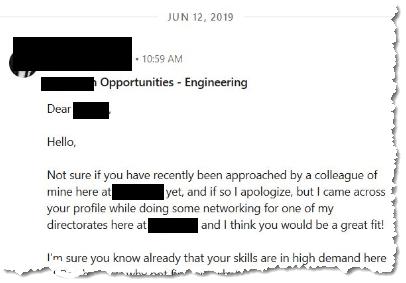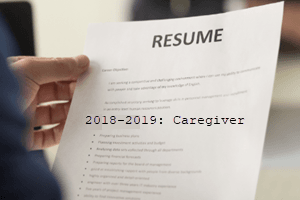In the February 25, 2020 Ask The Headhunter Newsletter a reader asks whether it’s possible to recover after accepting a job offer with a salary cut.
Question
I’ve been unemployed for six weeks. Was earning around $120K. Have been offered a position at $85K and, quite frankly, I need the money. Even more important, I recognize that my self-esteem is too bound up in my career: I need to work for more than just the money. Am seriously considering accepting this lower offer, because I believe these folks cannot afford to pay more. Will my chances of negotiating another position at a higher salary be irrevocably damaged if I accept a salary cut? Advice, please, and thanks in advance.
Nick’s Reply
You’re facing an important decision, and you need to be sure you are balancing the key issues. How long can you afford to go without a job? If you accept this offer, how much time will you be able to devote to continuing your search for one that pays better? Will being under-employed versus unemployed affect your self-esteem?
(And consider this: Is it possible to get more money out of a company that “cannot afford to pay more?” We’ll get to that at the end.)
What’s your objective?
I could easily tell you not to give in yet, and that it would be smarter to continue your search until you find a job where the pay is more in line with what you’re accustomed to. Six weeks is not a long time to find the right job. But being able to pay the bills is just as big a consideration. You could borrow to meet expenses until you find something better — but how would that affect your motivation and effectiveness in interviews?
These are very personal questions that only you can answer, and I think they are more relevant at this point than the main question you’ve asked: Will a salary cut damage your ability to win a higher salary later? While it might seem penny-wise and pound foolish to focus on the short-term problem (paying the bills), there’s something to be said for surviving today so you can stay in the game.
It’s important to think about what your objective really is.
Why a salary cut?
In today’s business climate, radical corporate restructurings and the outsourcing of jobs to “consulting firms” seem to be killing wages and salaries. While economists consider it a minor footnote and blow it off, stagnant wage growth tells us something is very wrong. Seemingly low unemployment suggests pay should be going up — but it’s not. This is for another discussion, but it seems the U.S. Department of Labor may be misrepresenting the impacts of masses of uncounted people who are returning to the labor market. I could make the argument that there is no talent or labor shortage; that in fact, we’re in an unprecedented talent glut. That’s why employers think they can hire you even with a salary cut.
There are a lot of good people on the street. Some employers are capitalizing on this by hiring great workers cheap. But this is no more of an ethical problem than you accepting a low-paying job while continuing your job search — and then quitting for a job with more pay.
(Is it ever worth taking a salary cut, other than because you need the money? I see one possible benefit, if you look at it as a re-tooling investment. A lower-paying job might be the price you pay for an opportunity to gain a foothold in a new field or business, and to learn new skills.)
Are good salaries dead?
While some employers are buying talent at a discount, others are smarter. They don’t assume that because you took a pay cut at your last job, you’re now worth less. They see an opportunity to land a great new employee who might not have been available to them otherwise at any price. (See Dr. Dawn Graham’s insightful article: The Salary Negotiation Mistake That’s Costing You.)
I know one very rare HR manager whose policy is to offer candidates what they’re really worth. If they are truly under-paid, she helps get their compensation back on track, and earns the new hire’s loyalty. Good salaries are not dead. (See Why employers should make higher job offers.)
So, no, I don’t think your chances for more money will be irrevocably damaged — not unless you become complacent. You must continue your job search if you take this lower-paying job. If you stay in the $85K job too long, you could indeed hurt yourself long-term.
Encourage better job offers
As you continue to search while newly employed, you must learn how to negotiate from a position of strength — even if the employer says it “cannot afford to pay more.”
- Never disclose what your current salary is. It’s none of their business. An employer will always use your current salary to negotiate against you. See We need to know your salary because —.
- Ask the employer what the salary range is before you agree to interview. Don’t fall into the trap of interviewing for jobs that won’t pay enough. You’re likely to rationalize accepting another low salary simply because you invested so much time in it.
- Assess the value you could add to any new job you’re considering. Can you do it faster, more efficiently, more profitably than the employer expects? Couch your salary expectations in terms of what you will bring to the employer’s bottom line. Be ready to explain it.
- Choose higher-paying jobs and, for each one, prepare a mini business plan that demonstrates clearly why you’re worth the money.
What counts most in any job negotiation is what positive impact you’re offering to an employer’s bottom line. That’s what wins you more money. Focus on conveying that critical message to an employer, and you’ll always be able to negotiate for more money — with a current employer, or with a new one.
Have you accepted a job with a salary cut? Why? Were you able to regain your higher salary level? How? What should this reader do? Do you believe salary cuts are more likely in today’s job market?
: :






 My daughter just went through what’s called a “stress interview.” She said she held it together, but came home and burst into tears. She didn’t know this was a thing. She’s had three such interviews in a row that left her feeling worthless in some unknown way. WHY is this a thing? It’s just mean. Why would anyone want to work with such awful people?
My daughter just went through what’s called a “stress interview.” She said she held it together, but came home and burst into tears. She didn’t know this was a thing. She’s had three such interviews in a row that left her feeling worthless in some unknown way. WHY is this a thing? It’s just mean. Why would anyone want to work with such awful people?
 20 HR recruiters from one [big-name defense contractor] contacted me via LinkedIn during 2019. One of them contacted me twice in two weeks, with the exact same message: Send me your most recent resume. She clearly didn’t know she had contacted me already. Others used the same message. I never heard from 19 of them again.
20 HR recruiters from one [big-name defense contractor] contacted me via LinkedIn during 2019. One of them contacted me twice in two weeks, with the exact same message: Send me your most recent resume. She clearly didn’t know she had contacted me already. Others used the same message. I never heard from 19 of them again.

 In your previous postings, you suggest that LinkedIn is a poor medium for applying to companies. (See
In your previous postings, you suggest that LinkedIn is a poor medium for applying to companies. (See 
 I have a year to go until I graduate from college. I’m not the best student, but I do pretty well. I’m here to learn, but there is a lot more to college and I take advantage of it. But now I’m a little worried. My grades could be better. I could spend a little less time at the pub, and more on academics. However, homework seems like a redundancy to me. I learn in lectures, in section classes and in assigned readings. Don’t misunderstand, I crank out the papers and I get ready for tests. But doing homework? It has nothing to do with preparing you for the real world. Even people who work long hours leave the office behind at the end of the day.
I have a year to go until I graduate from college. I’m not the best student, but I do pretty well. I’m here to learn, but there is a lot more to college and I take advantage of it. But now I’m a little worried. My grades could be better. I could spend a little less time at the pub, and more on academics. However, homework seems like a redundancy to me. I learn in lectures, in section classes and in assigned readings. Don’t misunderstand, I crank out the papers and I get ready for tests. But doing homework? It has nothing to do with preparing you for the real world. Even people who work long hours leave the office behind at the end of the day.


 Special Edition!
Special Edition! This is the last Ask The Headhunter column for 2019. I’m taking a couple of weeks off for the holidays! See you next on January 7, 2020! Here’s wishing you a
This is the last Ask The Headhunter column for 2019. I’m taking a couple of weeks off for the holidays! See you next on January 7, 2020! Here’s wishing you a 
 After months of looking for a job, I finally got an offer using your methods. (Thanks! The interviewer said I was the best candidate she’s talked to in a long time.) But there’s a small matter that concerns me, and it’s not the money. The salary is good. But neither the interviewer nor the HR person would tell me who my boss will be. HR just said I’d be assigned to the manager who needed my skills the most. Then she said they need my answer by end of day tomorrow. Is this a trap? Should I take the job?
After months of looking for a job, I finally got an offer using your methods. (Thanks! The interviewer said I was the best candidate she’s talked to in a long time.) But there’s a small matter that concerns me, and it’s not the money. The salary is good. But neither the interviewer nor the HR person would tell me who my boss will be. HR just said I’d be assigned to the manager who needed my skills the most. Then she said they need my answer by end of day tomorrow. Is this a trap? Should I take the job?